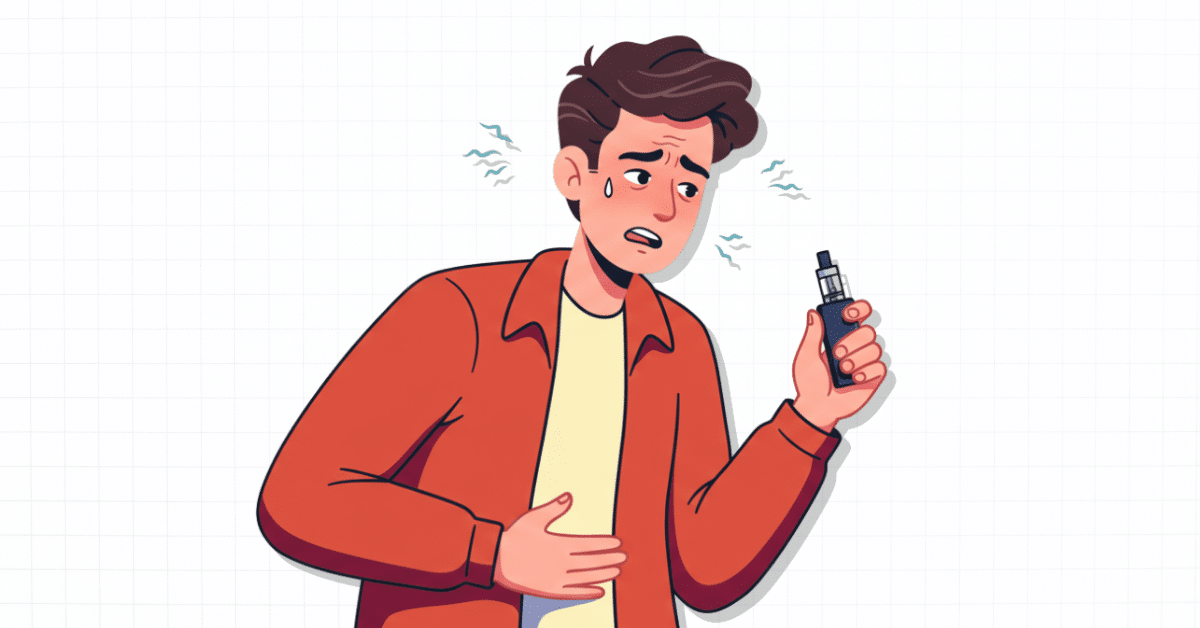Vaping has become a common habit for many, especially among young adults and former smokers. While most people are aware of the general effects of vaping, not everyone considers how timing and circumstances—like vaping on an empty stomach—can impact the experience.
Believe it or not, vaping without having eaten can lead to some unexpected and unpleasant side effects. From feeling lightheaded to dealing with nausea or shakiness, the absence of food can amplify nicotine’s impact on your body.
In this article, we’ll explore exactly what happens when you vape on an empty stomach and why it matters.
Download our free guide that has over 100+ of the best tips for healthy lungs.
Why Vaping on an Empty Stomach Hits Harder
When you vape on an empty stomach, your body absorbs nicotine more quickly and intensely. Normally, food in your system helps slow down the absorption of substances like nicotine, acting as a buffer. But without that buffer, nicotine enters your bloodstream faster, which can overwhelm your system—especially if you’re not used to it.
This rapid absorption can lead to symptoms like:
- Dizziness or lightheadedness
- Nausea or vomiting
- Shakiness or jitters
- Increased heart rate
- Headaches
Note: These symptoms can be particularly strong for new vapers or those with a low nicotine tolerance. Essentially, vaping on an empty stomach can feel like getting hit with a stronger dose than your body is ready for.
How to Avoid the Negative Effects of Vaping on an Empty Stomach
If you’ve ever felt queasy or dizzy after vaping, there’s a good chance your stomach was running on empty. Fortunately, there are simple ways to minimize these unpleasant side effects:
- Eat Before You Vape: Having a light snack or meal before vaping can slow nicotine absorption and prevent that sudden rush that leads to discomfort.
- Stay Hydrated: Dehydration can intensify side effects, so drink water throughout the day—especially if you’re vaping regularly.
- Start Slow: If you’re new to vaping or using a high-nicotine product, take fewer puffs and wait between hits to gauge your body’s reaction.
- Choose Lower Nicotine Strengths: High-nicotine vapes can be harsh, particularly on an empty stomach. Consider switching to a lower concentration if symptoms persist.
Note: By paying attention to your body and being mindful of when and how you vape, you can reduce the risk of feeling sick or uncomfortable.
Science Behind Nicotine Absorption
Nicotine is a fast-acting stimulant that gets absorbed through the lining of your mouth, throat, and lungs when you vape. Once it enters your bloodstream, it quickly travels to your brain, where it stimulates the release of dopamine—a chemical responsible for feelings of pleasure and reward.
But here’s where your stomach comes in: when you haven’t eaten, your body processes substances like nicotine more rapidly. Without food to slow down absorption, nicotine reaches your brain faster and in higher concentrations, which can intensify both its physical and psychological effects.
This “rush” may feel good to experienced users, but for many—especially those with a low tolerance—it leads to symptoms like dizziness, nausea, and shakiness. Think of it like drinking coffee on an empty stomach: the stimulant effects hit harder and faster, often in a not-so-pleasant way.

Long-Term Risks of Vaping Without Healthy Habits
While the immediate effects of vaping on an empty stomach can be uncomfortable, repeating this habit over time may lead to more serious consequences. Constant exposure to rapid nicotine spikes can increase your risk of developing a stronger dependence or addiction. Your body may begin to crave that intense rush, making it harder to quit or cut back.
In addition, consistently vaping without proper nutrition can strain your nervous system. Nicotine suppresses appetite in some individuals, which might lead to skipped meals and poor dietary habits—putting you at risk for fatigue, nutritional deficiencies, and mood swings.
Over time, these patterns may also impact your cardiovascular health, especially if you’re dehydrated or undernourished. Vaping may seem harmless to some, but pairing it with unhealthy routines—like not eating or neglecting hydration—can compound its effects in ways that are harmful in the long run.
FAQs About Vaping On an Empty Stomach
Is It Okay to Vape on an Empty Stomach?
Vaping on an empty stomach is generally not recommended, especially if you’re sensitive to nicotine. When you haven’t eaten, your body absorbs nicotine more quickly, which can lead to side effects like dizziness, nausea, shakiness, and headaches.
Without food to buffer the effects, nicotine hits your system harder, making it more likely you’ll feel unwell. To minimize these symptoms, it’s best to eat a light snack or meal before vaping. Staying hydrated also helps your body process nicotine more smoothly.
Does Vaping Affect the Stomach?
Yes, vaping can affect the stomach, especially if done on an empty one or in large amounts. Nicotine stimulates the digestive system and can sometimes cause stomach irritation, cramping, or nausea.
Some users also report acid reflux or appetite suppression after vaping. These effects are usually more pronounced in people who are new to vaping or sensitive to nicotine.
Note: Eating beforehand and vaping in moderation can reduce the likelihood of stomach discomfort and help your body handle nicotine better.
Why Do I Feel Sick After Vaping on an Empty Stomach?
Feeling sick after vaping on an empty stomach is often due to a rapid surge of nicotine in your bloodstream. Without food to slow the absorption, nicotine acts quickly and can overwhelm your system, especially if you’re new to vaping or using a high-strength product.
This can cause nausea, dizziness, headaches, or a general sense of queasiness—commonly known as being “nic sick.” Eating something before vaping and drinking water afterward can help reduce the chances of feeling sick.
What Will Happen If You Smoke on an Empty Stomach?
Smoking on an empty stomach can lead to many of the same side effects as vaping without eating. Nicotine is rapidly absorbed into the bloodstream when your stomach is empty, which can cause symptoms like nausea, dizziness, stomach pain, increased heart rate, and even vomiting.
You may also feel shaky or weak. Over time, smoking on an empty stomach can lead to poor appetite and potential digestive issues. To lessen these effects, it’s a good idea to eat something before smoking or vaping.
What Does It Mean to Be Nic Sick?
Being “nic sick” refers to the unpleasant symptoms that occur when someone consumes too much nicotine in a short period of time. This can happen from smoking or vaping, especially when done on an empty stomach or using a high-nicotine product.
Symptoms of being nic sick include nausea, dizziness, headaches, sweating, shakiness, rapid heartbeat, and sometimes vomiting. It’s more common in new users or those with low tolerance. Eating beforehand and pacing your nicotine intake can help prevent nic sickness.
When to See a Doctor for Vaping Sickness?
Most mild symptoms from vaping, like nausea or dizziness, pass with rest, hydration, and food. However, you should see a doctor if you experience more severe symptoms, such as chest pain, difficulty breathing, confusion, vomiting that won’t stop, or if symptoms last longer than a few hours.
These could be signs of nicotine poisoning or a more serious underlying issue. If you ever feel unsure or your condition worsens after vaping, it’s best to seek medical attention right away.
Final Thoughts
Vaping on an empty stomach might seem harmless at first, but it can quickly lead to uncomfortable side effects like nausea, dizziness, and headaches. These symptoms occur because nicotine is absorbed more rapidly without food in your system, hitting your body harder than expected.
Over time, repeating this habit can contribute to poor health, increased nicotine dependence, and nutritional issues. The good news is that these effects are avoidable.
By eating beforehand, staying hydrated, and vaping mindfully, you can reduce the risks and feel better overall. Understanding how your body reacts is key to making healthier choices.
Written by:
John Landry is a registered respiratory therapist from Memphis, TN, and has a bachelor's degree in kinesiology. He enjoys using evidence-based research to help others breathe easier and live a healthier life.
References
-
Benowitz NL, Hukkanen J, Jacob P 3rd. Nicotine chemistry, metabolism, kinetics and biomarkers. Handb Exp Pharmacol. 2009.
- Banks E, Yazidjoglou A, Joshy G. Electronic cigarettes and health outcomes: epidemiological and public health challenges. Int J Epidemiol. 2023.


